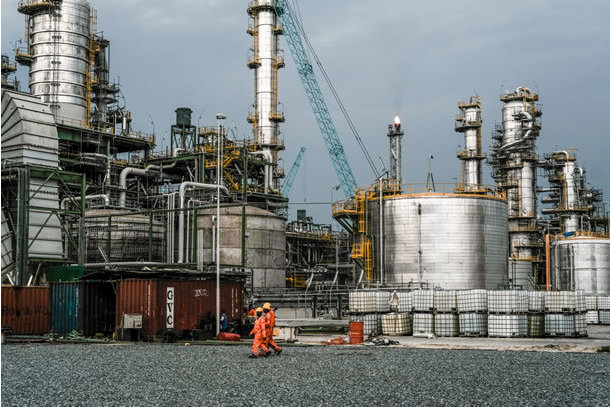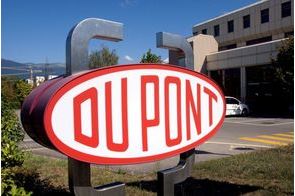Dangote refinery and the ESG elephant in the room

Summary
Would Dangote simply privatise profits from his refinery, while socialising the risks associated with its operations?
The Dangote Refinery and Petrochemical Company was formally inaugurated with great fanfare on 22 May 2023, by former Nigerian President, Muhammadu Buhari. 10 years after it was first announced by Aliko Dangote, the billionaire and President of Dangote Group – and seven years after construction began in 2016 – the finished project, located in Ibeju-Lekki, Lagos, was hailed by Buhari as a “game-changer” for the downstream sector of the petroleum industry in Nigeria and the African continent.
Many stakeholders have described the oil refinery as a transformative project, with the Nigerian Economic Summit Group (NESG) saying it will create a $21 billion market for Nigeria’s crude oil, establishing the country as a global energy player. The United States-based Project Management Institute (PMI) said it will fuel "Nigeria’s economic transformation from importer to self-sustaining powerhouse."
According to the Central Bank of Nigeria governor, Godwin Emefiele, the company will save Nigeria over $26 billion in foreign exchange (FX) as refined petroleum products, fertilisers, and petrochemicals will now be purchased in naira. Nigeria has been importing over 80% of refined petroleum products for domestic demand, thereby putting significant pressure on the value of the local currency.
With the promise that the first private refinery in the country will end the reliance on imported petroleum products, Ndubuisi Ekekwe of the Tekedia Institute offered some of the most grandiose superlatives that have been used to describe Dangote. The professor and inventor said the billionaire is the "most important business leader of his generation in Africa" and the only person who can make the naira stronger.
The new biggest refinery in Africa is also praised for having the world's largest single crude distillation unit (CDU), unlike many other big refineries that use multiple distillation units. Products from the 650,000 barrels per day (bpd)-capacity refinery – including Premium Motor Spirit (PMS), diesel, kerosene, and aviation jet fuel – are expected to be available in the market by the end of July this year.
From an initial estimated cost of about $9 billion to build the refinery, the project was eventually completed at a total cost of $19 billion. According to the CBN governor, Dangote invested 50% equity and the other half of the project cost was debt-financed by domestic and foreign banks, including $650 million from the African Export-Import Bank (Afreximbank) and $150 million support from the World Bank's private sector arm, the International Finance Corporation (IFC).
ESG imperatives
Regardless of the potentially transformative impact of the Dangote Refinery, there are a number of environmental, social, and governance (ESG) issues the company needs to address for it to be maximally efficient and fully accountable to a wide range of stakeholders, including ordinary Nigerians. ESG is becoming a mainstream framework for businesses and other organisations to more effectively engage in risk management. It helps in reducing companies' exposures to environmental, social, and governance risks, while also optimising opportunities.
Studies have shown that business leaders have come to the realisation that focusing solely on profit maximation for shareholders is no longer a tenable proposition. Effective management of ESG factors involves reducing carbon emissions, creating economic opportunities for employees and the communities, and strengthening compliance with regulations and laws. In other words, ESG requires developing sustainable and responsible business practices, including evaluating and measuring non-financial performance.
First and foremost, the Dangote Refinery raises concerns about its potential negative impact on Nigeria's ability to achieve the national Net-Zero emissions target by 2060. Net-Zero entails eliminating the greenhouse gas (GHG) emissions that cause climate change, or striking a balance in the additional emissions produced and the equivalent amount being removed from the atmosphere. Nigeria and other countries around the world have pledged to reverse global warming by achieving Net-Zero by the mid-century.
The burning of fossil fuels (coal, crude oil, and natural gas) for energy production accounts for three-quarters of GHG emissions. Research by Our World in Data has shown that not much progress has been made in decarbonising the world's energy systems, including electricity, transport, and heating. As of 2019, fossil fuels still accounted for 84.3% of energy production, while only 16% of global primary energy came from low-carbon sources (such as nuclear energy, hydropower, wind, solar, bioenergy, and geothermal).
Given the dominant role that fossil fuels still play in the world’s energy systems, it is not surprising that global temperatures have continued to rise. A recent report by the World Meteorological Organisation says average temperatures are likely to exceed 1.5 degrees Celsius above pre-industrial levels for the first time in human history within the next five years. This means that commitments made by governments under the Paris Agreement to limit temperature increase to 1.5C have so far fallen far short of what is required.
According to the Climate Action Tracker (CAT), Nigeria’s energy sector plans, including the plan to expand oil and gas production, are at odds with the Paris Agreement. The Dangote Refinery would possibly increase the nation's carbon footprint as oil refineries contribute about 4% of the global carbon emissions.
The Saint Augustine principle
Many African nations and experts make the compelling argument that the continent, which has contributed the least to global warming, must be allowed to develop fossil fuel resources to help lift their people out of poverty. They insist that developed nations, which industrialised using fossil fuels, should not impede the development of Africa by preventing the continent from using its own fossil fuel resources. It is a case of invoking the famous Saint Augustine's prayer, "make me chaste, but not yet!"
However, this argument downplays the clear and present danger of climate change to the African continent, which ironically is the most vulnerable region in the world to the impact of global warming. The African Development Bank (AfDB) says climate change represents a major threat to achieving the continent’s Sustainable Development Goals (SDGs).
The World Bank, which is making significant investment in climate finance, has also spent nearly $15 billion to finance fossil fuel projects since 2015, according to a report by the Guardian UK. The bank said that its loan to the Dangote Refinery was “designed to help Nigeria increase the value addition of its natural resources sector, specifically through fertilisers.” While the bank has rightly gotten flak for investing in fossil fuel projects in Africa, the loans could simply be providing guarantees for foreign commercial financing and facilitating the procurement of foreign technologies for the projects.
Decarbonisation paradox
The Dangote Refinery has made the case that it is climate-friendly. According to the group’s president, the refinery went through effortful environmental approval processes under the Ministry of Environment. Furthermore, the company is reportedly compliant with World Bank’s and European Union’s emission standards. In 2017, the refinery procured a range of equipment from Elessent Clean Technologies (formally known as DuPont Clean Technologies) to minimise its environmental impact.
Devakumar V.G. Edwin, Group Executive Director (Strategy, Capital Projects and Portfolio Development) at Dangote Group, said in an interview that products from the refinery can be exported to any country in Europe or the U.S. However, these are countries with high fuel efficiency standards. Western countries have stringent regulatory standards for sulfur content in PMS and diesel, with most countries limiting sulfur content to 15 parts per million (ppm) of sulfur or less.
Even if the refinery’s ESG practices achieve reduction in GHG emissions from sources within its operations (the so-called scope 1 and 2 emissions), this would only constitute 10-20% of emissions from its products, per a paper published in Frontiers by Nixon Sunny, a Senior Researcher at Imperial College London, and his co-authors. The remaining 80-90% (scope 3 emissions) is associated with fuel use by consumers.
For example, should Dangote Refinery produce cleaner AFRI-6 fuels (with 10 ppm sulphur content), as touted by the company and the African Refiners and Distributors Association (ARDA), it would be akin to putting new wine in old bottles. The advantage of cleaner fuels will be lost because they will be put in mostly fuel inefficient vehicles. Nigeria is the highest importer of used vehicles on the African continent. Hence, most of the vehicles purchased second-hand are major emitters of carbon dioxide (CO2).
Transport accounts for around 24% of global carbon emissions from energy sources, based on 2018 figures by International Energy Agency (IEA); yet, Nigeria has not implemented automotive fuel economy standards either in terms of vehicle fuel consumption such as litres of PMS per 100 kilometres of travel (L/100-KM) or automobile GHG emission standards (expressed as grammes per kilometre). London-based Global Fuel Economy Initiative has been working with stakeholders in Nigeria, including the National Automotive Design and Development Council (NADDC), to promote cleaner fuels and automotive fuel economy in the country, but implementation of the resulting recommendations has been lacking.
Apart from the GHGs that fossil fuel refineries release into the atmosphere, they also emit other harmful substances, such as lead, sulfur dioxide, nitrogen oxides, and particulate matter, which constitute public health challenges to nearby residents who may be exposed to the risks of cancer, stroke, and respiratory problems, among other diseases.
Improving environmental and social sustainability
Without prejudice to the environmental and social impact mitigation strategies put in place by the Dangote Refinery, studies have shown that various modern refineries minimise the environmental and health impacts associated with their operations by incorporating several measures and strategies. For instance, properly managing waste and responsibly treating and disposing toxic materials will enhance Dangote Refinery’s environmental and social responsibility.
Improvement in energy efficiency is often a continuous process with the aim of eventually decarbonising the entire value chain of the refinery's operations. The Dangote Refinery is said to have a 435 megawatts (MW) power plant. But it is unclear what percentage of low-carbon sources make up the energy mix of the refinery.
According to an article by the American scientific journal, ACS Publications, post-combustion capture (PCC) systems constitute a technically and economically viable solution for reducing emissions. PCC is the process of removing CO2 from the flue gas after combustion, and storing it, preventing the GHG from entering the atmosphere. Optimising a PCC system is a huge opportunity for reducing carbon footprint, according to Maryro Mendez, an Oil and Refining Research Analyst at Vitol, who noted that 80% of refinery's carbon emissions come from fuel combustion.
While Dangote cannot control the emissions in the transport sector and generators used in homes and businesses, there needs to be strong regulatory oversight to ensure the company produces the quality of products it says it will produce and comply with strict emissions standards to reduce its environmental and health impacts.
‘Too big to govern’?
Much has been debated about the "special treatments" given to Dangote Group. In 2017, some Nigerians remonstrated against the Buhari administration's upward review of Dangote Group's five-year tax holiday to 10 years. The government said the tax incentive was granted under the Road Infrastructure Tax Credit Scheme (RITCS) to facilitate the company's rehabilitation of some roads. Some critics have argued that the administration and management of the scheme lacks transparency and accountability, while others contend that the scheme is being used to give Africa's richest man a disproportionate advantage over other entrepreneurs. The International Monetary Fund (IMF) has called for a review of the country’s huge tax expenditure, describing it as an erosion on revenue.
Allegations of government's unfair preferential treatment of the group has also been raised regarding its refinery. NNPC Limited owns 20% equity in the refinery, with its stake valued at $2.6 billion. The Group CEO of NNPC, Mele Kyari, told the National Assembly that the location of the Dangote Refinery at a Free Trade Zone means there are “several incentives” granted to the business. However, the full scope of these incentives is unknown.
Besides ensuring availability of FX to facilitate the payment of imported equipment, the CBN also provided about N125 billion in loans for the project during a period when economic growth was sluggish and many Nigerian businesses could neither access loans from banks nor get FX from the CBN to import critical inputs.
Nevertheless, Prof. Ekekwe – a notable defender of the incentives granted to Dangote – has compared the Nigerian incentives system to the U.S. government's support granted to the companies of entrepreneurs like Elon Musk and Jeff Bezos. What people like Ekekwe have failed to emphasise is that the U.S. tax credits, grants, loans, etc. are governed by very strict conditions and the regulatory regimes are unambiguous. For instance, Tesla, which is an automaker, has enjoyed government support aimed at incentivising the adoption of electric vehicles by making them affordable and encouraging consumers to purchase them. Moreover, the credit is available until the automaker has sold 200,000 units of eligible vehicles after which it no longer qualifies for the federal incentives worth up to $7,500 per vehicle.
Incentives are also available for investing in renewable energy infrastructure, making it more financially viable for companies like Amazon to transition to clean energy sources. The incentives help in creating jobs, including for people from economically disadvantaged backgrounds. Europe and China have similar rules aimed at incentivising low-carbon development.
The removal of the PMS subsidy regime announced by the new administration of President Bola Ahmed Tinubu is expected to end the blackhole of corruption that has long plagued the downstream oil and gas sector in Nigeria. Consequently, the government will save billions of naira spent on fuel subsidy payments once the Dangote Refinery comes on stream.
But would Dangote's petroleum products, fertilisers, and petrochemicals be more affordable for Nigerians given the incentives the company has enjoyed? Would the company use its big advantages to produce clean fuels and lead in renewable energy generation? Or would it simply privatise profits, while socialising the risks associated with its operations? And would the company commit to strong governance practices and comply with regulations or has it become too big to govern? These are some of the big ESG questions for the company and its shareholders.
Martins Hile is a sustainability strategist and editorial consultant.
Related
-
UK’s Ministry of Defence achieving its sustainability goals –GlobalData
By 2025, the ESG practices of prospective partner companies will be considered before the MoD awards any contracts.
-
ESG Shariah funds to experience strong growth
Respondents believe that if investment products were certified as both Shariah- and ESG-compliant more non-Muslims than ...
-
DuPont publishes 2022 sustainability report
The report details progress on the company’s sustainability strategy organized under three pillars: Innovate, Protect ...










_Charging__Power_Grid_-_300x350-202501141447571577.jpg)